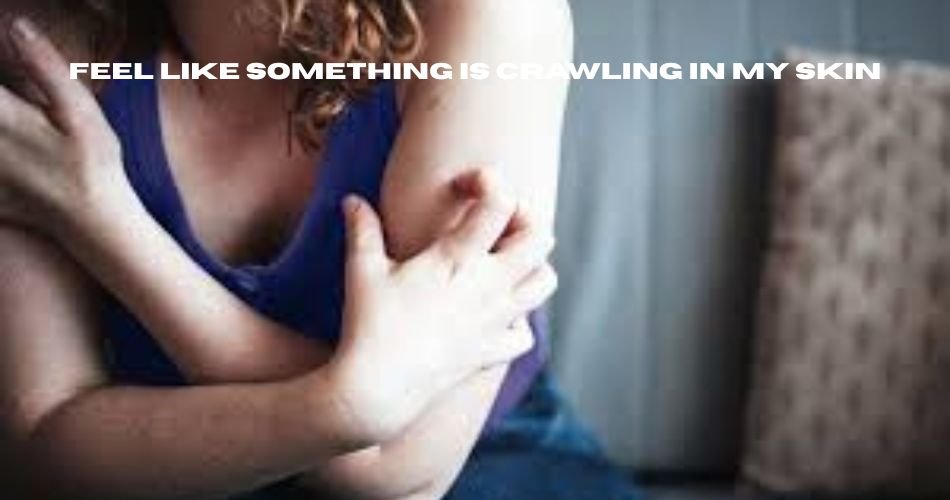Feeling like something is crawling in your skin is not only an unsettling experience but also a confusing one. This sensation, medically referred to as formication, often strikes without warning and can persist for minutes, hours, or even longer. It’s often described as a tingling, prickling, or bug-like sensation beneath or on the surface of the skin. For many people, it’s deeply disturbing, especially when there’s no visible cause. This feeling can happen anywhere on the body—arms, legs, scalp, or back—and sometimes it is accompanied by itching, burning, or even pain. Understanding why you may feel like something is crawling in my skin is the first step to managing or eliminating the sensation.
Understanding Formication and Its Causes
Formication is a type of paresthesia, a condition characterized by abnormal skin sensations such as tingling, prickling, or the feeling of pins and needles. It can be caused by a wide range of factors including physical, neurological, hormonal, and psychological conditions. Common physical causes include extremely dry skin, allergic reactions, or irritants from new clothing materials, body lotions, or detergents. Neurologically, formication may arise from nerve damage, often seen in people with peripheral neuropathy or multiple sclerosis. Additionally, psychological conditions like high anxiety or stress can cause your brain to misinterpret nerve signals, leading to the phantom crawling sensation.
The Role of Anxiety and Mental Health
One of the most underestimated causes of the crawling skin sensation is psychological distress. When you’re anxious or going through a period of high emotional stress, your body’s nervous system becomes hyperactive. This heightened state can cause nerve misfiring, leading to the illusion of crawling or tingling. For people with severe anxiety or panic disorders, these sensations can become recurring and even debilitating. In extreme cases, individuals may develop delusional parasitosis, a condition where one becomes convinced that insects or parasites are actually living under the skin. This condition requires psychiatric intervention, but milder forms linked to stress or anxiety can often be treated with therapy, relaxation techniques, and sometimes medication.
Neurological Disorders and Crawling Sensations
Neurological issues are among the most serious causes behind the feeling that something is crawling in your skin. Conditions like peripheral neuropathy, fibromyalgia, or pinched nerves can all contribute to sensations that mimic the presence of bugs or small creatures. In peripheral neuropathy, damaged nerves misfire and send incorrect signals to the brain, creating sensations that aren’t based on actual stimuli. This is especially common in individuals with diabetes, where high blood sugar levels gradually destroy the protective covering of nerves. Multiple sclerosis and Parkinson’s disease also fall into this category, often presenting with abnormal sensations on the skin, including crawling, tingling, or even electrical-like shocks.
Hormonal Changes and Formication
Changes in hormone levels, particularly among women, can trigger strange skin sensations including crawling. One major period where this occurs is menopause. As estrogen levels drop, the skin becomes thinner and drier, and nerve sensitivity can increase, making the skin feel itchy or like something is crawling on it. Similar symptoms can occur during pregnancy or even in the days before menstruation, though they are typically less intense than those during menopause. Hormonal imbalances related to thyroid dysfunction can also produce comparable sensations and should not be overlooked.
The Impact of Drugs and Medications
Certain medications can cause formication as a side effect. These include drugs used for ADHD, antidepressants, antipsychotics, and some chemotherapy agents. Recreational drugs, especially stimulants like methamphetamine and cocaine, are notorious for producing intense crawling sensations. Users often describe feeling like bugs are beneath their skin—a condition sometimes called “meth mites.” Withdrawal from alcohol, benzodiazepines, or narcotics can also cause these sensations due to the nervous system’s reaction to the absence of the substance. If you recently started or stopped a medication and began experiencing crawling sensations, it’s important to speak with your healthcare provider about possible side effects or withdrawal symptoms.
Skin Conditions That May Be Responsible
Although formication is most often linked with nerve or psychological issues, sometimes the cause is more superficial. Skin conditions such as eczema, psoriasis, or allergic reactions can also lead to sensations of crawling, especially when accompanied by itching or inflammation. Fungal infections, including athlete’s foot or ringworm, may also cause tingling and crawling feelings as the skin reacts to the infection. These types of causes are typically accompanied by visible signs such as redness, rashes, or peeling skin. Treating the underlying skin condition usually alleviates the sensation over time.
How to Tell if It’s Real or Imagined
One of the most distressing aspects of this condition is the doubt it can cause. People often wonder if there really are bugs on them or if it’s just a trick of the mind. The best way to differentiate is through careful observation. If there are no visible insects and the sensation persists even after washing the area, it’s likely neurological or psychological rather than an actual infestation. Scratching or picking at the skin can lead to open wounds, so it’s important to resist the urge and seek professional guidance instead of self-diagnosing or overreacting to the sensation.
When You Should Seek Medical Help
While occasional sensations of crawling skin may not require medical intervention, persistent or worsening symptoms should never be ignored. If you feel like something is crawling in my skin frequently, especially if it disrupts your sleep or daily routine, it’s time to consult a doctor. Additionally, if the feeling is accompanied by numbness, pain, burning, or weakness, it may point to an underlying neurological disorder. Your doctor may conduct skin exams, blood tests, and neurological evaluations to determine the root cause. In some cases, referrals to dermatologists or neurologists may be necessary.
Effective Treatments for Crawling Sensations
The best treatment depends on identifying the cause. If the issue stems from dry skin, then regular moisturizing with unscented, dermatologically-tested lotions can offer relief. For anxiety-related causes, cognitive behavioral therapy, breathing exercises, or anti-anxiety medication may help reduce the episodes. If a neurological disorder is diagnosed, treatments may include medication to manage nerve pain or physical therapy to relieve pressure on affected nerves. For those experiencing hormonal formication, hormone replacement therapy or managing thyroid levels may alleviate symptoms. Drug-related cases may require detox programs and professional monitoring to manage withdrawal and eliminate lingering nerve effects.
At-Home and Natural Remedies
For those seeking non-pharmaceutical relief, there are several at-home remedies that may help. Regularly moisturizing with aloe vera or coconut oil can soothe irritated skin. Drinking plenty of water helps hydrate from the inside out. Applying cold compresses or using anti-itch creams like calamine lotion can offer short-term relief. Taking a warm bath with Epsom salts may relax the muscles and ease nerve sensitivity. Mindfulness practices, yoga, and breathing exercises can be particularly beneficial for stress-induced crawling sensations. Additionally, limiting intake of caffeine and alcohol, which can overstimulate the nervous system, may reduce the frequency of symptoms.
Preventing Future Episodes
If you’ve experienced this sensation before, you’ll likely want to avoid a repeat episode. One of the most effective ways to prevent crawling sensations is through a combination of healthy lifestyle practices. Regular exercise boosts circulation and helps regulate nerves. Getting consistent, high-quality sleep allows the body to repair and stabilize. A balanced diet rich in vitamins B12, D, and Omega-3 fatty acids supports nerve health and skin vitality. Managing stress through mindfulness, reducing screen time, and seeking emotional support can also create a significant positive impact. Tracking your symptoms in a journal can help identify patterns or triggers so you can make informed changes.
Conclusion
Feeling like something is crawling in your skin can be more than just an irritating sensation—it can signal deeper issues ranging from skin conditions to neurological or psychological disorders. While the sensation is very real and sometimes overwhelming, there are numerous ways to treat and manage it. From basic skin care and stress relief to medical treatment for nerve or hormonal problems, relief is within reach. The key lies in understanding the potential causes and working with healthcare professionals to find a solution that addresses your specific situation. By staying informed and proactive, you can take control of this discomfort and improve your quality of life.






